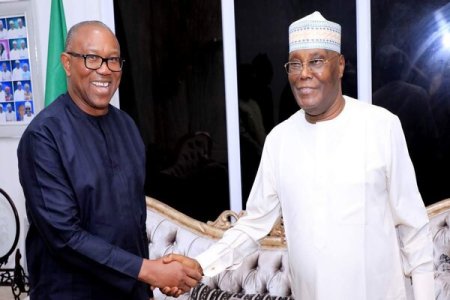
APC leaders express concerns over a potential alliance between Atiku Abubakar and Peter Obi ahead of the 2027 elections. Analysts suggest this political realignment could challenge the APC's dominance.
The ruling All Progressives Congress (APC) is expressing growing concerns over potential alliance moves between former Vice President Atiku Abubakar and opposition figure Peter Obi ahead of the 2027 general elections. APC stalwarts are reportedly unsettled by signals from Atiku that he may support Obi's potential presidential bid, along with other signs of opposition coordination that could pose a threat to the APC's hold on power.
In a recent interview with BBC Hausa Service, Atiku Abubakar indicated he would support Peter Obi if the Peoples Democratic Party (PDP) decides the presidential ticket should go to the Southeast in 2027. Atiku's comments came after meetings with several political heavyweights, including his 2023 running mate Ifeanyi Okowa and Obi himself. Atiku emphasized the possibility of merging with Obi's Labour Party to achieve a common goal, signaling a potential consolidation of opposition forces against the APC.
Prominent figures within the APC have reacted with apprehension to these developments. An unnamed APC chieftain from the North West revealed that discussions within the party hierarchy often revolve around the potential alliance, with hopes that it will collapse before gaining traction. This sentiment reflects concerns that the economic difficulties and dissatisfaction with current policies could make an Atiku-Obi alliance a formidable alternative. Another party leader noted the disenchantment among Northern leaders with the current administration, further complicating the APC's position.
Additional reactions from APC members highlight the internal strife and dissatisfaction with recent appointments and policies. The women leaders of the party recently protested their exclusion from palliatives and appointments, voicing concerns that resonate with broader apprehensions about party unity and support.
Political analysts suggest that an Atiku endorsement of Obi could significantly impact the 2027 electoral landscape by galvanizing opposition forces and appealing to diverse ethnic and regional voting blocs. Aminu Yakudima, a public affairs commentator, called the potential opposition strategy a significant threat to the APC, while Professor Abubakar Kari of the University of Abuja noted that a strong, unified opposition could pose a serious challenge depending on political dynamics leading up to the elections.
Meanwhile, other opposition moves and negotiations, such as those led by former Kaduna State Governor Nasir el-Rufai using the Social Democratic Party (SDP) platform, indicate broader efforts to consolidate anti-APC sentiment. These developments underscore the fluid and competitive nature of Nigerian politics as the 2027 elections approach.
The emerging alliance between Atiku and Obi, if successful, could reshape the political landscape and challenge the APC's dominance, setting the stage for a highly contested 2027 election.




